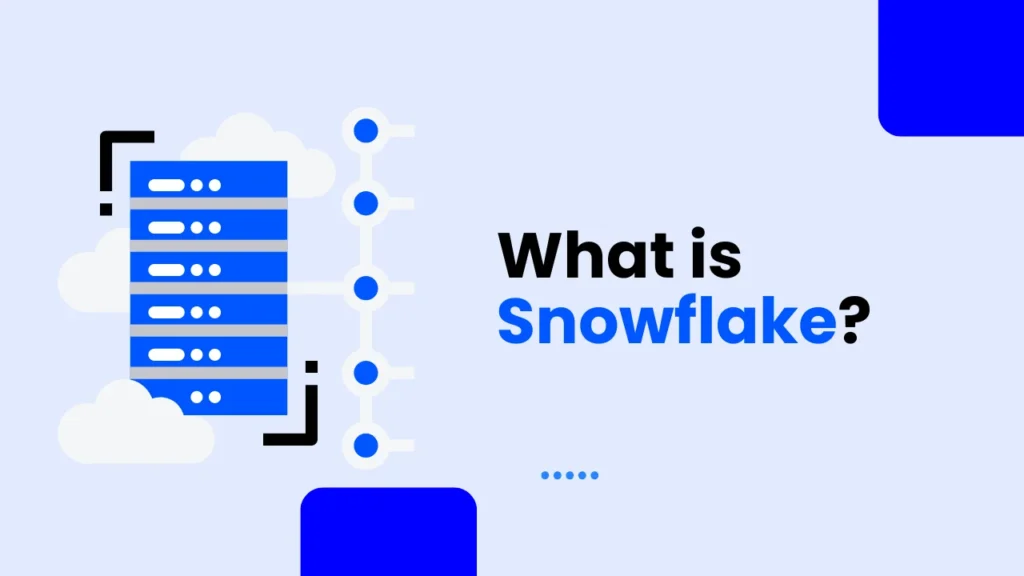What is Snowflake?
Snowflake is a cloud-native data warehousing platform designed to handle the demands of modern data analytics. Unlike traditional data warehouses that are often limited by on-premises infrastructure, Snowflake is built entirely on cloud architecture, offering unmatched scalability, flexibility, and ease of use. Snowflake’s unique architecture allows it to efficiently manage and analyze large volumes of structured and semi-structured data, making it a go-to solution for organizations aiming to optimize their data environments.

Why Snowflake?
Snowflake stands out due to its multi-cluster, shared-data architecture, which separates storage from compute. This decoupling allows organizations to scale these resources independently, ensuring consistent performance even during high-demand periods. Snowflake’s adherence to standard SQL means it’s accessible to a wide range of data professionals, and its seamless integration with major cloud providers like AWS, Google Cloud, and Azure makes it a future-proof choice for organizations of all sizes.
How Does Snowflake Work?
Snowflake’s architecture is composed of three primary layers:
1. Data Storage:
Snowflake automatically manages data storage in a compressed and encrypted format across multiple cloud regions. It organizes data into micro-partitions, which optimize both performance and cost. This storage management is entirely automated, ensuring data is always available and accessible, without the need for manual intervention.
2. Compute Resources (Virtual Warehouses):
Virtual warehouses in Snowflake are dedicated compute clusters that handle the processing of queries and data manipulations. Each virtual warehouse operates independently, allowing multiple queries to run concurrently without resource contention. This setup enables dynamic scaling, where warehouses can be resized or suspended based on demand, further optimizing compute costs.
3. Cloud Services:
The cloud services layer in Snowflake manages essential functions such as authentication, metadata management, and query optimization. Snowflake’s query optimizer uses advanced algorithms to generate efficient execution plans, ensuring high performance across all operations.
Why Do Organizations Use Snowflake?
Organizations choose Snowflake for its ability to offer high concurrency, robust performance, and elastic scalability while simplifying operations and reducing costs. Snowflake’s support for diverse data formats, combined with its strong security features, makes it an essential platform for data-driven businesses.
When Should Organizations Consider Snowflake?
Organizations should consider adopting Snowflake when they:
- Require a highly scalable data platform that can grow with their business needs.
- Need to manage large volumes of both structured and semi-structured data.
- Seek to optimize costs through a pay-as-you-go pricing model.
- Require robust data sharing capabilities across teams and partners.
- Desire a platform that continuously improves performance without additional infrastructure investments.
What Are the Benefits of Using Snowflake?

- High Performance: Snowflake’s architecture ensures rapid query execution, even during peak workloads.
- Elastic Scalability: Scale compute and storage independently based on demand, optimizing both performance and cost.
- Cost Efficiency: Snowflake’s pay-as-you-go model ensures you only pay for the resources you use, eliminating wasted spend.
- Enhanced Security: Snowflake provides comprehensive security features, including end-to-end encryption, network isolation, and compliance with industry standards.
- Automatic Performance Enhancements: Benefit from continuous platform improvements without the need for manual intervention.
What Makes Snowflake a Foundational Platform for Organizations?
Snowflake serves as a foundational platform by providing a unified, scalable solution for data storage, processing, and analytics. Its cloud-native architecture ensures that organizations can adapt to changing data needs without the limitations of traditional data warehousing solutions. The continuous enhancement of Snowflake’s performance and features ensures it remains at the cutting edge, delivering ongoing value to organizations.
Discover why partnering with advansappz for Snowflake data, analytics, AI, and machine learning is a game-changer. Check out our blog on Top 5 Reasons to Partner with Advansappz for Snowflake Success to learn how we can help you excel with Snowflake.
Cost Management & Performance Optimization
Snowflake is designed to minimize Total Cost of Ownership (TCO) while maximizing performance, helping organizations achieve faster time to insights and production.
Minimize TCO with Snowflake’s Fully-Managed Platform:
Snowflake’s consumption-based pricing model ensures that you only pay for the resources you use, eliminating costs associated with unused capacity. By avoiding traditional software licenses and leveraging its elastic scalability, Snowflake significantly reduces the total cost of ownership (TCO).
Decrease Unplanned Downtime and Operational Risks:
Snowflake’s resilient cloud architecture minimizes the risk of unplanned downtime, ensuring continuous availability and reducing operational risks associated with data management.
Reduce Business Operations Costs:
Snowflake’s pay-as-you-go pricing model eliminates the need for large upfront investments in hardware, significantly lowering infrastructure costs. Additionally, Snowflake’s fully managed platform reduces administrative overhead, allowing IT teams to focus on higher-value business tasks.
Built-in Cost Management Capabilities:
Snowflake offers tools to manage and optimize spend effectively. Features like Resource Monitors for virtual warehouses and Budgets for specific resource groups help organizations control their spending and prevent budget overruns. Snowflake also provides insights into usage metrics, enabling better financial planning and resource allocation.
Optimize Spend Through Best Practices:
By adopting best practices such as optimizing query performance, managing storage efficiently, and refining workload execution, organizations can further reduce costs and improve the overall efficiency of their Snowflake environment.
Maximize Value Through Snowflake’s Continuous Platform Improvements and Performance Features

Snowflake continuously enhances its platform, automatically rolling out performance improvements that benefit all users. These enhancements can lead to faster query times, improved query processing, and overall better platform efficiency.
Snowflake Performance Index (SPI):
The Snowflake Performance Index (SPI) allows organizations to track these improvements over time, providing insights into the platform’s evolving efficiency.
Serverless Performance Optimization Features:
Snowflake’s serverless architecture includes features that automatically optimize queries, storage, and workloads, ensuring that your environment remains performant without the need for manual tuning.
How advansappz can help
We offer a comprehensive range of services designed to help organizations maximize their investment in Snowflake:
- Strategic Consultation: We assist organizations in understanding how Snowflake can be integrated into their data strategy and identify opportunities for optimization, ensuring alignment with business objectives and long-term goals.
- Implementation and Deployment: Our experts ensure a seamless Snowflake deployment, tailored to meet your specific business needs, while also integrating with existing systems and workflows for maximum efficiency.
- Optimization and Maintenance: We provide ongoing support to optimize performance, manage costs, and ensure your Snowflake environment operates efficiently, enabling your organization to get the most out of its data platform.
- Data & AI Integration: We help unlock the full potential of your data by integrating AI and machine learning capabilities within Snowflake. This empowers your business to drive advanced analytics, predictive insights, and automated decision-making processes.
- Data Migration Services: We facilitate the migration of data from legacy systems to Snowflake, minimizing disruption to your operations while ensuring data integrity and security throughout the process.
- Training and Support: We offer comprehensive training to ensure your team can fully leverage Snowflake’s capabilities, maximizing ROI and empowering your organization to achieve its data-driven goals.
Let us guide you in transforming your data infrastructure with Snowflake, data, and AI solutions. Contact us today to explore how we can help you achieve unparalleled efficiency, scalability, and insights.
Frequently Asked Questions (FAQs)
- What types of data can Snowflake handle?
Snowflake supports both structured data (e.g., SQL databases) and semi-structured data formats (e.g., JSON, Avro, Parquet), making it versatile for various data use cases. - How does Snowflake ensure data security?
Snowflake employs end-to-end encryption, network isolation, and adheres to compliance standards like GDPR, HIPAA, and SOC 2 to protect your data. - How does Snowflake’s pricing model work?
Snowflake uses a consumption-based pricing model, meaning you only pay for the compute and storage resources you actually use, which helps in optimizing costs. - Can Snowflake be deployed across multiple cloud platforms?
Yes, Snowflake is cloud-agnostic and can be deployed on AWS, Google Cloud, and Azure, allowing flexibility in choosing your preferred cloud environment. - What are some best practices for optimizing Snowflake spend?
Best practices include setting up Resource Monitors to track usage, creating Budgets for specific resource groups, and following guidelines to optimize query performance and storage management, ensuring efficient consumption of resources.












